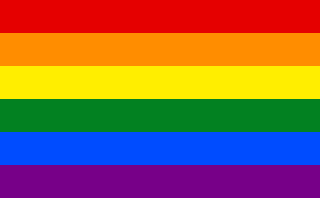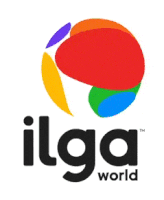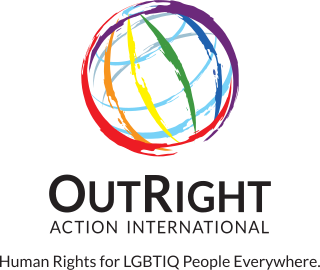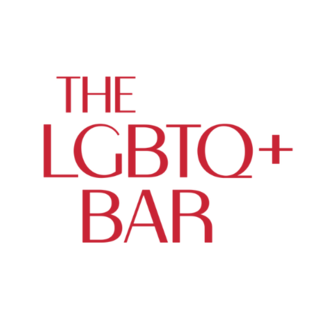
Lesbian, gay, bisexual, transgender and queer (LGBTQ) movements are social movements that advocate for LGBTQ people in society. Although there is not a primary or an overarching central organization that represents all LGBTQ people and their interests, numerous LGBTQ rights organizations are active worldwide. The first organization to promote LGBTQ rights was the Scientific-Humanitarian Committee, founded in 1897 in Berlin.

LGBTQ is an initialism of lesbian, gay, bisexual, transgender and queer or questioning. It is an umbrella term, broadly referring to all sexualities, romantic orientations, and gender identities which are not heterosexual or cisgender.

The International Lesbian, Gay, Bisexual, Trans and Intersex Association (ILGA) is a LGBTQ+ rights organization.

ILGA-Europe is the European region of the International Lesbian, Gay, Bisexual, Trans and Intersex Association. It is an advocacy group promoting the interests of lesbian, gay, bisexual, trans and intersex (LGBTI) people, at the European level. Its membership comprises more than 500 organisations from throughout Europe and Central Asia. The association enjoys consultative status at the United Nations Economic and Social Council and participatory status at the Council of Europe.

OutRight International (OutRight) is an LGBTIQ human rights non-governmental organization that addresses human rights violations and abuses against lesbian, gay, bisexual, transgender and intersex people. OutRight International documents human rights discrimination and abuses based on their sexual orientation, gender identity, gender expression and sex characteristics in partnership with activists, advocates, media, NGOs and allies on a local, regional, national and international level. OutRight International holds consultative status with ECOSOC.

Lesbian, gay, bisexual, and transgender (LGBT) people in Armenia face legal and social challenges not experienced by non-LGBT residents, due in part to the lack of laws prohibiting discrimination on the grounds of sexual orientation and gender identity and in part to prevailing negative attitudes about LGBT persons throughout society.

LGBTQ movements in the United States comprise an interwoven history of lesbian, gay, bisexual, transgender and queer social movements in the United States of America, beginning in the early 20th century. A commonly stated goal among these movements is social equality for LGBTQ people. Some have also focused on building LGBTQ communities or worked towards liberation for the broader society from biphobia, homophobia, and transphobia. LGBTQ movements organized today are made up of a wide range of political activism and cultural activity, including lobbying, street marches, social groups, media, art, and research. Sociologist Mary Bernstein writes:
For the lesbian and gay movement, then, cultural goals include challenging dominant constructions of masculinity and femininity, homophobia, and the primacy of the gendered heterosexual nuclear family (heteronormativity). Political goals include changing laws and policies in order to gain new rights, benefits, and protections from harm.

Lesbian, gay, bisexual, and transgender (LGBT) rights in Kosovo have improved in recent years, most notably with the adoption of the new Constitution, banning discrimination based on sexual orientation. Kosovo remains one of the few Muslim-majority countries that hold regular pride parades.
The Victorian Pride Lobby is a community-based advocacy group that works towards equality, social justice and advancing human rights for lesbian, gay, queer, bisexual and same-sex attracted people in Victoria.

The National LGBTQ+ Bar Association, formerly the National Lesbian and Gay Law Association and the National LGBT Bar Association, is a national association of lawyers, judges and other legal professionals, law students, activists, and affiliated lesbian, gay, bisexual, transgender legal organizations. It was formally founded in 1989 and became an official affiliate of the American Bar Association in 1992. The association is headquartered in Washington, D.C., and its current executive director is D’Arcy Kemnitz.

Global Action for Trans Equality (GATE) is an organisation and think tank on gender identity, sex characteristics and bodily diversity issues. The current executive director is Mauro Cabral Grinspan. Cabral Grinspan is an Argentinian intersex and trans activist, and signatory of the Yogyakarta Principles.

The following outline offers an overview and guide to LGBTQ topics:
Kenita Placide is a human rights, HIV, and LGBT activist from St. Lucia. They are the founder and Executive Director the Eastern Caribbean Coordinator of Caribbean Forum for Liberation and Acceptance of Genders and Sexualities (CariFLAGS). Between 2014 and 2016, they served at the Women's Secretariat for the International Lesbian, Gay, Bisexual, Trans and Intersex Association. They have been on the forefront of bringing LGBT issues into discussion throughout the Anglo-Caribbean and international community.
Insight is a Ukrainian LGBTQI organization. Unlike most Ukrainian LGBT organizations focused on work with gay men and MSM, Insight’s priority is to help lesbians, bisexual women, transgender, queer and intersex people. Insight is one of the few public organizations in working with transgender people.

Intersex people are born with sex characteristics that "do not fit the typical definitions for male or female bodies". They are substantially more likely to identify as lesbian, gay, bisexual, or transgender (LGBT) than endosex people. According to a study done in Australia of Australian citizens with intersex conditions, participants labeled 'heterosexual' as the most popular single label with the rest being scattered among various other labels. According to another study, an estimated 8.5% to 20% experiencing gender dysphoria. Although many intersex people are heterosexual and cisgender, this overlap and "shared experiences of harm arising from dominant societal sex and gender norms" has led to intersex people often being included under the LGBT umbrella, with the acronym sometimes expanded to LGBTI. Some intersex activists and organisations have criticised this inclusion as distracting from intersex-specific issues such as involuntary medical interventions.

GALZ An Association of LGBTI People in Zimbabwe is an organisation established in 1990 in Harare to serve the needs of the lesbian, gay, bisexual, transgender and intersex (LGBTI) community in Zimbabwe. GALZ's vision is "a just society that promotes and protects human rights of LGBTI people as equal citizens in Zimbabwe".

Olena Olehivna Shevchenko is a Ukrainian women's and LGBT rights activist. After working as a teacher, she co-founded the NGO Insight in 2007 to advocate for LGBT inclusiveness on feminist platforms. She started annual events including Women's Day March, Transgender Day of Remembrance and the Festival of Equality, to protest against discrimination against women and the LGBT community in Ukraine and in other former Soviet countries. Her opponents have repeatedly attacked her and her events.

Peter Schieder was an Austrian politician of the Socialist Party of Austria (SPÖ) and Chairman of the Socialist Youth Austria (SJÖ).













